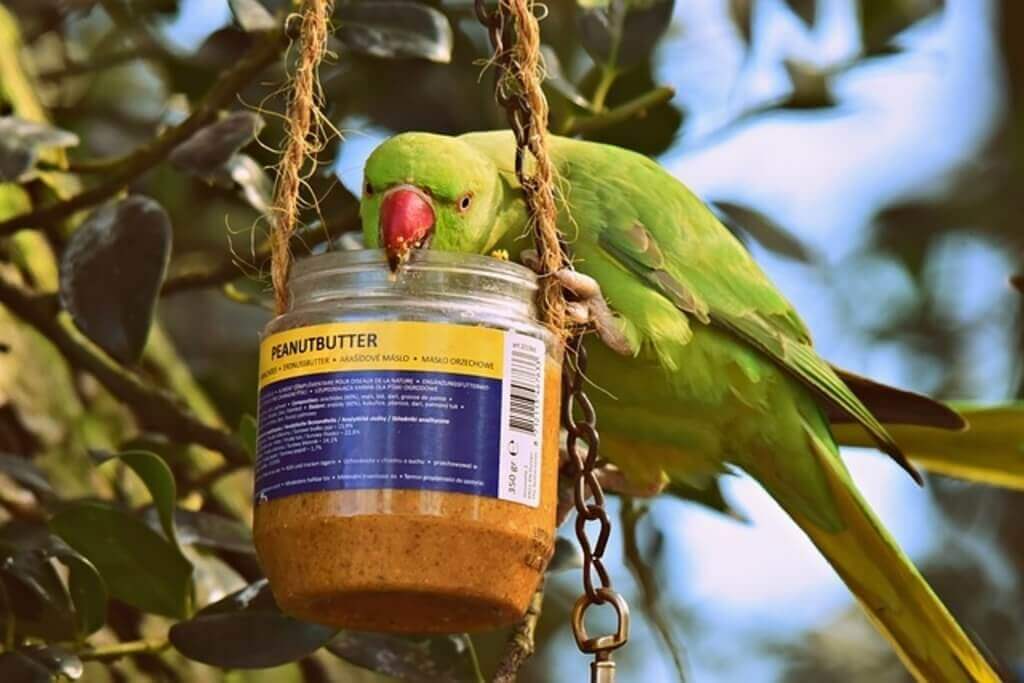As a bird enthusiast, I often find myself wondering about the best foods to provide for our feathered friends. One question that frequently comes up is can birds eat peanut butter.
In this article, I will explore the topic of feeding peanut butter to birds, including its safety, nutritional benefits, potential risks, and alternative food options. Let’s delve into the fascinating world of bird diets and peanut butter.
Table of Contents
- 1 Key Takeaways:
- 2 Is Peanut Butter Safe for Birds to Eat?
- 3 Nutritional Benefits of Peanut Butter for Birds
- 4 Risks and Precautions of Feeding Birds Peanut Butter
- 5 Can Birds Choke on Peanut Butter?
- 6 Alternative Bird Foods and Precautions
- 7 Tips for Feeding Birds Peanut Butter
- 8 Birds That Enjoy Peanut Butter
- 9 Peanut Butter Alternatives for Birds
- 10 Benefits of Peanut Butter for Birds
- 11 Conclusion
- 12 FAQs
- 12.1 How to make bird feed with peanut butter?
- 12.2 Can you put peanut butter in bird seed?
- 12.3 Do birds eat oatmeal with peanut butter?
- 12.4 What animals like peanut butter?
- 12.5 Can you mix peanut butter and birdseed together?
- 12.6 What is a good substitute for peanut butter in bird feeders?
- 12.7 Can parrots eat peanut butter?
- 12.8 Can parakeets eat peanut butter?
- 12.9 Can wild birds eat peanut butter?
- 13 Source Links
- 14 Author
Key Takeaways:
- Birds can safely eat peanut butter, but it’s important to choose natural or organic varieties with the fewest additives.
- Peanut butter provides birds with high protein and healthy fats, which are beneficial for their overall health and energy.
- Regularly check for signs of spoilage and mold in peanut butter to ensure bird safety.
- Alternative bird foods such as suet cakes, mealworms, and bird seed blends are also nutritious options.
- Feeding peanut butter to birds during cooler seasons is recommended to avoid spoilage and potential feather issues.
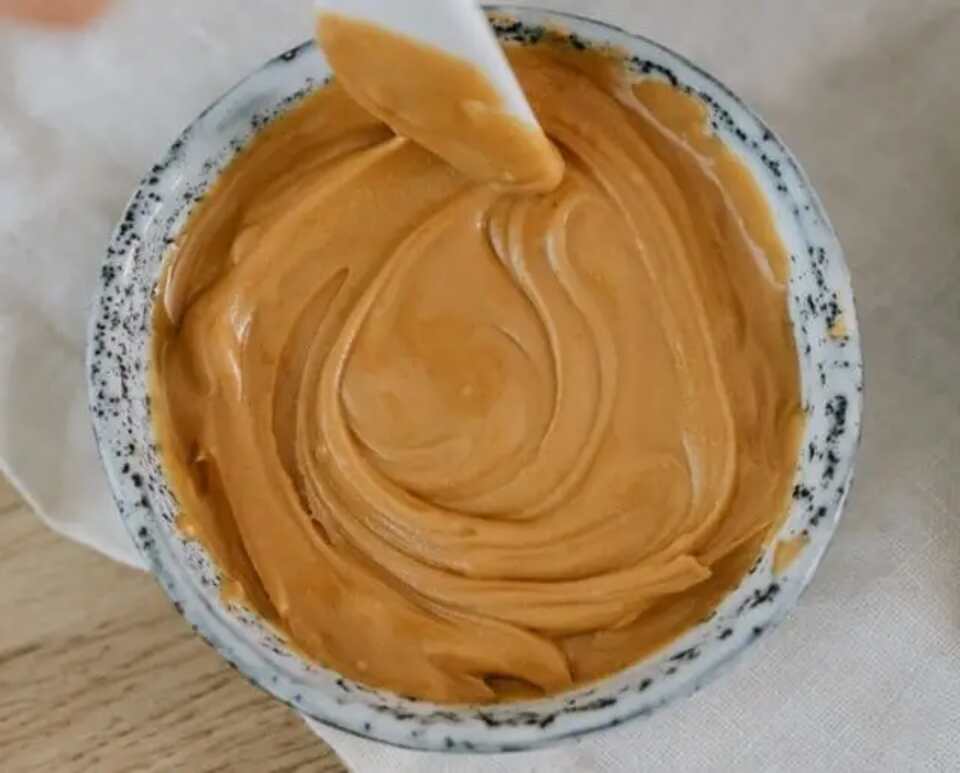
Is Peanut Butter Safe for Birds to Eat?
Peanut butter itself won’t hurt birds, but there are a few things to consider. One concern is the potential for peanut butter to go bad and become a breeding ground for bacteria and mold. It’s important to regularly check for spoilage and discard any questionable peanut butter.
Additionally, it’s best to offer peanut butter during cooler seasons as warm temperatures can cause it to spoil rapidly. There is also the potential for salmonella outbreaks to affect peanut butter production, so it’s important to remove any affected peanut butter from feeders during recalls or outbreaks.
Feeding wild birds peanut butter should be done with caution and responsibility. While birds may enjoy this tasty treat, it is essential to be mindful of their health. Choosing natural or organic peanut butter with the fewest additives can help minimize potential risks.
Offering peanut butter in moderation and monitoring its freshness can ensure the birds are not exposed to spoiled or contaminated food. By taking these precautions, we can provide a safe and enjoyable feeding experience for our feathered friends.
The Importance of Feeding Bird-Safe Peanut Butter
When it comes to feeding birds peanut butter, not all types are created equal. Some peanut butter brands contain additives like salt, sugar, or hydrogenated oils that can be harmful to birds’ health. To ensure the safety of our avian friends, it is crucial to opt for bird-safe peanut butter options.
Natural or organic peanut butter with no added salt or sweeteners is the best choice for birds. These options provide the essential protein and healthy fats that birds need without any unnecessary additives.
| Peanut Butter Brand | Ingredients | Bird-Safe |
|---|---|---|
| Brand A | Peanuts, salt, sugar, hydrogenated oils | No |
| Brand B | Organic peanuts | Yes |
| Brand C | Peanuts, salt, organic cane sugar, palm oil | No |
Feeding birds peanut butter can be a delightful experience for both humans and birds. However, it is essential to prioritize bird health and choose bird-safe options to prevent any adverse effects. Natural or organic peanut butter without additives or harmful ingredients is the best choice when offering this treat to our feathered friends.
Nutritional Benefits of Peanut Butter for Birds
Peanut butter is a nutritious food for birds, providing them with protein and healthy fats that are essential for their overall health and energy. It is a calorie-dense food, which is particularly beneficial during the winter when birds need to conserve energy to stay warm. When choosing peanut butter for bird feeding, it is important to opt for natural or organic varieties with the fewest additives.
Avoid peanut butter that contains high amounts of salt or sweeteners, such as xylitol, can be harmful to birds. These additives can cause health issues for birds, including dehydration and digestive problems. It is recommended to offer birds unsalted and unsweetened peanut butter to ensure their safety and well-being.
Birds are known to enjoy the taste and texture of peanut butter, making it a popular choice among bird feeders. Offering peanut butter can attract a variety of bird species to your yard, allowing you to observe and enjoy their presence.
To ensure the safety of birds when feeding peanut butter, it is best to mix in grit. melted beef fat, wheat germ or cornmeal to break up the stickiness. This can help reduce the risk of feathers becoming stuck together or clogging their pores if transferred to eggs in the nest.
Additionally, it is important to regularly clean feeders to maintain bird health and prevent the growth of bacteria or mold.
| Benefits of Peanut Butter for Birds |
|---|
| Provides protein and healthy fats |
| Calorie-dense for winter energy conservation |
| Attracts a variety of bird species |
| No evidence of harm from salts or sweeteners |
Feeding birds peanut butter in a responsible and safe manner can offer them a delicious and nutritious treat while enhancing your bird-watching experience.
Risks and Precautions of Feeding Birds Peanut Butter
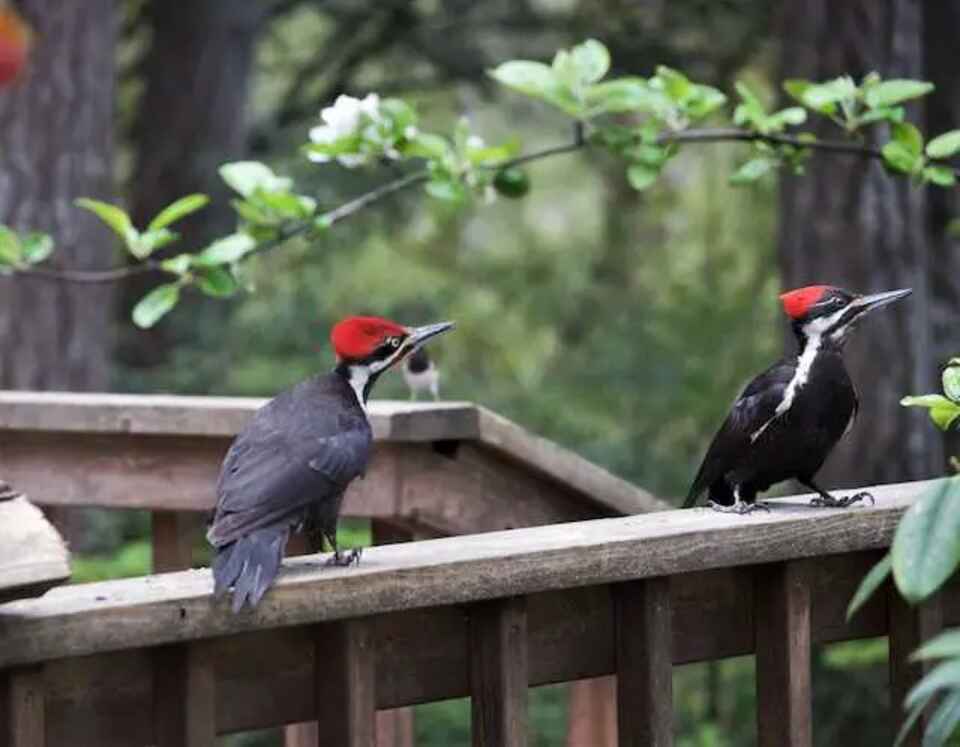
While peanut butter can be a delicious treat for birds, it is important to be aware of potential risks and take necessary precautions when feeding it to them. Here are some considerations to keep in mind:
Potential Risks
- Bacterial growth: Peanut butter can become a breeding ground for bacteria and mold if it spoils. Regularly check for signs of spoilage and discard any questionable peanut butter to avoid potential harm to the birds.
- Feather issues: When peanut butter separates into solids and oils, it can stick to birds’ feathers, potentially causing problems. If these substances transfer to eggs in the nest, they can clog pores and harm the birds’ reproductive cycle. It is best to save peanut butter for the cooler seasons when most birds are not nesting.
Precautions
- Cooler seasons: Offer peanut butter to birds during cooler seasons, as warm temperatures can cause it to spoil rapidly.
- Mix it up: To reduce the stickiness of peanut butter and prevent potential feather issues, consider mixing in grit, wheat germ, melted beef fat or cornmeal before offering it to birds.
- Regular cleaning: Ensure that bird feeders are regularly cleaned to maintain bird health and prevent the growth of bacteria or mold.
By being aware of these risks and taking the necessary precautions, you can safely provide birds with peanut butter as a tasty and nutritious treat in your yard.
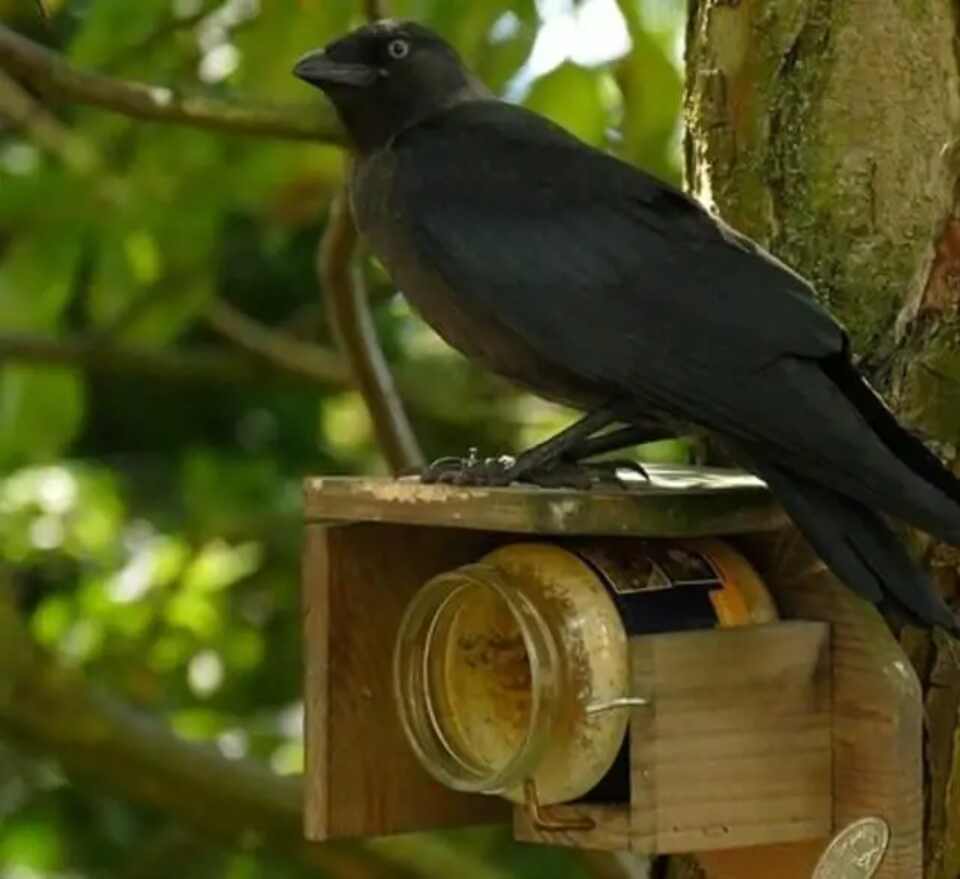
Can Birds Choke on Peanut Butter?
While it is a common concern, there is no documented evidence that birds can choke on peanut butter. However, it’s important to note that birds have smaller mouths and less muscular tongues compared to humans, which can make consuming sticky substances like peanut butter a bit challenging for them.
Birds have evolved to consume a wide variety of foods in nature, including nuts, seeds, insects, and fruit, which they are well-equipped to eat safely. Nonetheless, when offering peanut butter, it’s crucial to keep the feeders clean and free from any contaminants that could potentially pose a health hazard to the birds.
“While there is no documented evidence of birds choking on peanut butter, it’s always best to take precautions when feeding them any new food. Mixing in cornmeal can help break up the stickiness and make it easier for birds to eat.”
By being mindful of the consistency of the peanut butter and ensuring the cleanliness of the feeding area, bird enthusiasts can provide this tasty treat to their feathered friends without compromising their safety.
As with any other food, it’s important to monitor the birds’ behavior and adjust feeding practices accordingly to promote their overall well-being.
| Peanut Butter Feeding Precautions | Benefits of Peanut Butter for Birds |
|---|---|
| Mix cornmeal with peanut butter to reduce stickinessRegularly clean feeders to maintain bird healthMonitor birds’ behavior when introducing new foods | High protein and healthy fats for bird nutritionCalorie-dense treat beneficial during colder seasonsAttracts a variety of bird species to your yard |
Alternative Bird Foods and Precautions
While peanut butter can be a great treat for birds, there are alternative bird foods to consider. These options provide variety and can cater to different bird species’ preferences. Here are some alternatives to peanut butter for feeding birds:
Suet Cakes: Suet cakes are high-energy snacks made from animal fat and mixed with various seeds, nuts, and fruits. They are particularly beneficial for birds during the winter months when they need extra calories to stay warm.
Mealworms: Mealworms are larvae of darkling beetles and are a great source of protein for birds. They can be served dried or live, attracting a variety of species such as bluebirds, wrens, and robins.
Bird Seed Blends: Opt for bird seed blends that contain a mix of different seeds, grains, and nuts. These blends offer a balanced diet for birds and can attract a diverse range of species to your yard.
When feeding birds peanut butter or any other food, it’s important to take certain precautions to ensure their safety. Here are some tips to keep in mind:
- Mix in grit or cornmeal with the peanut butter to break up its stickiness and reduce the risk of feathers sticking together.
- Regularly check the bird feeders for signs of spoilage or mold and clean them to maintain bird health.
- Provide a variety of food options to cater to different bird species’ dietary needs and preferences.
By offering alternative bird foods and taking necessary precautions, you can provide a diverse and nutritious diet for the birds in your yard while ensuring their well-being.
Tips for Feeding Birds Peanut Butter
When offering peanut butter to birds, there are some essential tips to ensure safe and enjoyable feeding. By following these guidelines, you can provide birds with a nutritious treat while maintaining their health and well-being.
1. Choose the Right Peanut Butter
When selecting peanut butter for birds, opt for natural or organic varieties with the fewest additives. Avoid low-fat options as they may not provide as much nutritional value for the birds. Look for crunchy peanut butter to offer an extra nutty treat.
2. Offer Peanut Butter in Cooler Seasons
It’s best to provide peanut butter to birds during cooler seasons, as warm temperatures can cause it to spoil rapidly. By offering it during the right time of year, you can ensure that the peanut butter remains fresh and safe for the birds to consume.
3. Regularly Check for Spoilage
Be vigilant and regularly check the peanut butter for signs of spoilage, such as mold or a rancid smell. If you notice any questionable peanut butter, it’s important to discard it immediately to prevent any potential harm to the birds.
4. Mix in Grit or Cornmeal
To reduce stickiness and potential feather issues, consider mixing grit or cornmeal with the peanut butter. This will help break up the stickiness and make it easier for birds to eat without any undue complications.
By following these tips, you can safely offer peanut butter to birds as a delicious and nutritious supplement to their diet. Remember to keep the feeders clean and provide a fresh supply of peanut butter regularly to attract a variety of bird species to your yard.
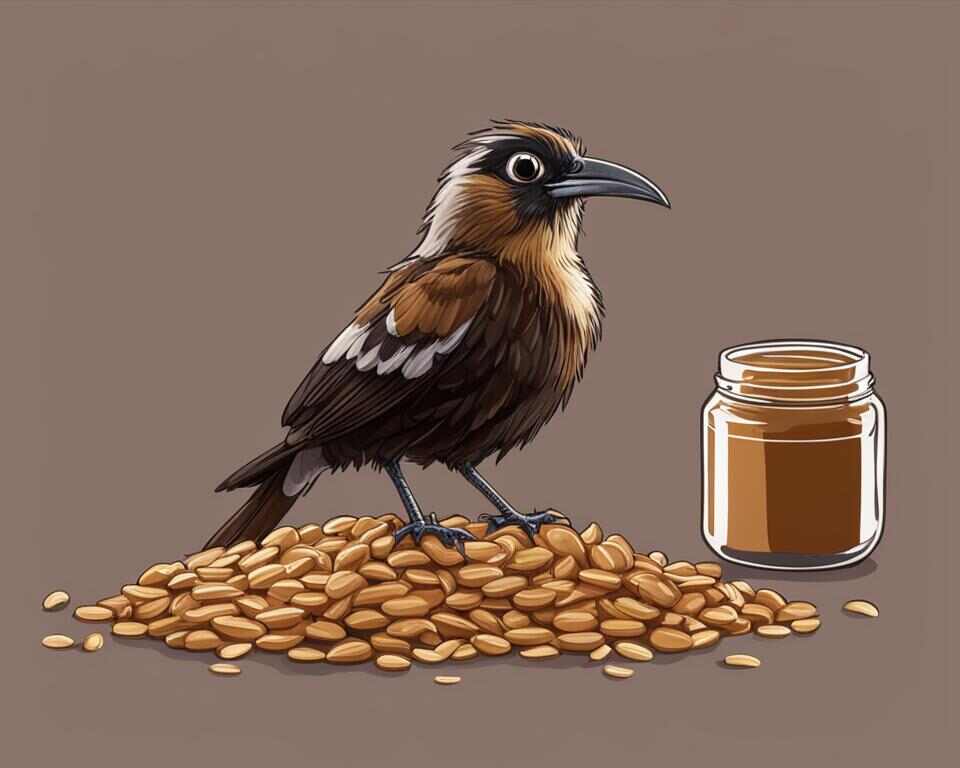
Birds That Enjoy Peanut Butter
Several bird species enjoy peanut butter as a tasty and nutritious treat. Blue jays, woodpeckers, nuthatches, and wrens are among the birds that are particularly attracted to this food. To attract these birds to your yard, you can try smearing peanut butter on tree bark or slathering pine cones in a mixture of peanut butter and bird seed.
This not only provides them with a delicious snack but also offers them essential nutrients to support their overall health and energy.
In particular, blue jays are known for their affinity for peanut butter. These striking birds with their vibrant blue feathers are a common sight in backyards across the United States. They have strong beaks that can easily break through the nutty spread, making peanut butter a perfect treat for them.
Woodpeckers, with their strong claws and sharp beaks, also enjoy the rich and creamy texture of peanut butter. Their ability to cling to tree trunks allows them to easily access the smeared peanut butter.
“Peanut butter is like a gourmet meal for birds. It provides them with a rich source of protein and healthy fats, which are essential for their overall well-being.” – Expert ornithologist
Nuthatches, with their unique ability to climb down trees headfirst, are also fans of peanut butter. These small birds can easily navigate the bark to find the tasty treat. Similarly, Wrens, known for their cheerful songs, are attracted to the scent and taste of peanut butter.
By offering peanut butter to these birds, you can create a welcoming environment in your yard and enjoy the beauty and melodies of these feathered visitors.
| Bird Species | Attraction to Peanut Butter |
|---|---|
| Blue Jays | Known to be especially attracted to peanut butter, thanks to their strong beaks. |
| Woodpeckers | Enjoy the rich and creamy texture of peanut butter. |
| Nuthatches | Can easily navigate trees to find the tasty treat. |
| Wrens | Attracted to the scent and taste of peanut butter. |
By offering peanut butter to these birds, you not only provide them with a delicious treat but also have the opportunity to observe their unique behaviors and vibrant plumage up close.
Remember, when using peanut butter as bird food, it’s essential to follow the proper precautions and offer it responsibly, ensuring the safety and well-being of the birds that visit your yard.
Peanut Butter Alternatives for Birds
If you’re looking for alternatives to peanut butter for feeding birds, there are several bird-friendly snacks and foods to consider. These options can provide birds with a nutritious and enticing treat while catering to their specific dietary needs.
Suet Cakes:
Suet cakes are a popular alternative to peanut butter. They are made from animal fat and can be mixed with various ingredients such as seeds, fruits, and insects. Suet cakes are high in energy and provide birds with the necessary fats and proteins to survive the winter months.
Mealworms:
Mealworms are another excellent option for attracting birds. They are a natural food source for many bird species and are rich in protein. You can offer live mealworms or dried ones, which are readily available in pet stores and online.
Bird Seed Blends:
Bird seed blends are a versatile choice that can attract a wide variety of bird species. Opt for blends that include a mix of seeds, nuts, and grains to provide a balanced diet for the birds. Look for blends specifically formulated for the types of birds you want to attract.
| Bird-Friendly Snacks | Benefits |
|---|---|
| Suet Cakes | High-energy food source |
| Mealworms | Rich in protein |
| Bird Seed Blends | Attracts a variety of bird species |
When choosing bird-friendly snacks, it’s important to avoid additives, artificial flavors, and preservatives. Opt for natural and organic options whenever possible to ensure the health and well-being of the birds. Consider rotating between different snacks to provide variety and keep the birds engaged.
By offering these wildlife-friendly alternatives to peanut butter, you can create an inviting environment for birds in your yard while promoting their overall health and well-being.
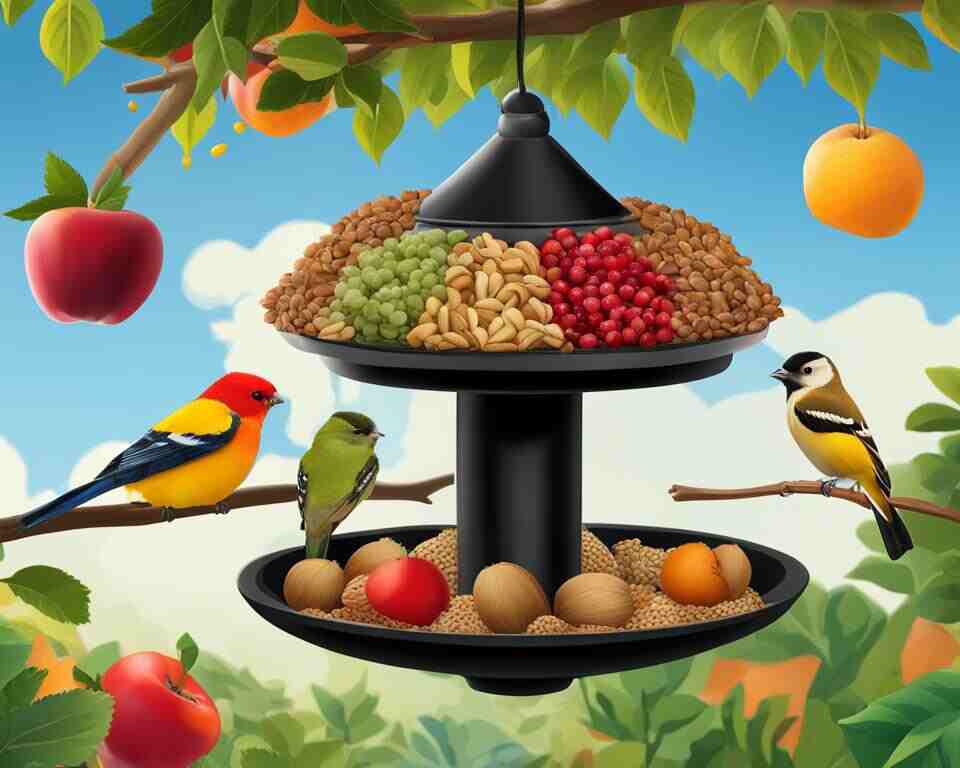
Benefits of Peanut Butter for Birds
During the colder winter months when food sources may be scarce, peanut butter can help birds survive by providing them with the calories they need to maintain their body temperature and conserve energy.
Feeding birds peanut butter can attract a wide variety of bird species to your yard, allowing you to enjoy watching their behavior and appreciate their beauty up close. Blue jays, woodpeckers, nuthatches, and wrens are among the birds that particularly enjoy peanut butter.
Smearing peanut butter on tree bark or slathering pine cones in peanut butter and bird seed can create a bird-friendly feeding station and make your yard a welcoming habitat for these birds.
In addition to its nutritional benefits and attraction to birds, peanut butter can also be a source of entertainment for bird watchers. Observing birds as they interact with peanut butter feeders can provide hours of enjoyment and a deeper appreciation for these fascinating creatures.
Furthermore, offering peanut butter to birds is a simple and cost-effective way to support their well-being and contribute to their conservation.
Table: Birds that Enjoy Peanut Butter
| Bird Species | Preference for Peanut Butter |
|---|---|
| Blue jays | High preference |
| Woodpeckers | High preference |
| Nuthatches | High preference |
| Wrens | Moderate preference |
By providing birds with peanut butter in a responsible and safe manner, you can offer them a delicious and nutritious treat while also attracting a diverse range of bird species to your yard. Enjoy the beauty and wonder of birds as they interact with peanut butter feeders, and take pleasure in knowing that you are helping to support their health and well-being.
Conclusion
In conclusion, peanut butter can be a safe and nutritious treat for birds when offered responsibly. Birds can eat peanut butter and benefit from its high protein and healthy fat content. However, there are precautions to consider to ensure the safety and well-being of the birds.
When choosing peanut butter for birds, opt for natural or organic varieties with minimal additives. These types of peanut butter are healthier for birds and provide them with the necessary nutrients. It’s also important to offer peanut butter during cooler seasons when the risk of spoilage is lower.
Regularly check for signs of spoilage, such as mold or rancidity, and discard any questionable peanut butter. Mixing in grit or cornmeal can help break up the stickiness and reduce the potential risk of feathers becoming coated. Keeping the feeders clean is essential to maintain bird health.
By following these precautions and offering peanut butter in a responsible manner, you can provide birds with a delicious and nutritious treat while enjoying their presence in your yard.
FAQs
How to make bird feed with peanut butter?
Create bird feed by mixing peanut butter with seeds, nuts, and dried fruits. You can spread this mixture on pinecones or use it as a base for homemade bird cakes.
Can you put peanut butter in bird seed?
Absolutely, you can blend peanut butter with birdseed to craft a high-energy bird feed that’s sure to attract feathered friends to your yard.
Do birds eat oatmeal with peanut butter?
Certainly, birds relish oatmeal combined with peanut butter, especially during colder months as it provides extra energy to keep them warm.
What animals like peanut butter?
Peanut butter is a favorite of various wildlife, including birds, squirrels, and some insects. It’s a versatile and enticing treat.
Can you mix peanut butter and birdseed together?
Yes, mixing peanut butter with birdseed is an effective way to offer birds a nutritious and appealing food source, perfect for your bird feeders.
What is a good substitute for peanut butter in bird feeders?
Sunflower butter and suet make excellent substitutes for peanut butter in bird feeders. They provide essential nutrients and are well-received by birds.
Can parrots eat peanut butter?
Yes, parrots can eat peanut butter in moderation. Ensure it’s natural, unsalted peanut butter without additives, and offer it as an occasional treat, as part of their diverse diet.
Can parakeets eat peanut butter?
Yes, parakeets can eat peanut butter in moderation. Use natural, unsalted peanut butter without additives, and offer it occasionally as a treat alongside their balanced diet.
Can wild birds eat peanut butter?
Yes, wild birds can eat peanut butter, but it should be offered in moderation and with certain precautions. Use natural, unsalted peanut butter without additives, mix it with birdseed, or spread it on surfaces like pinecones. Keep the feeding area clean to ensure their well-being.

